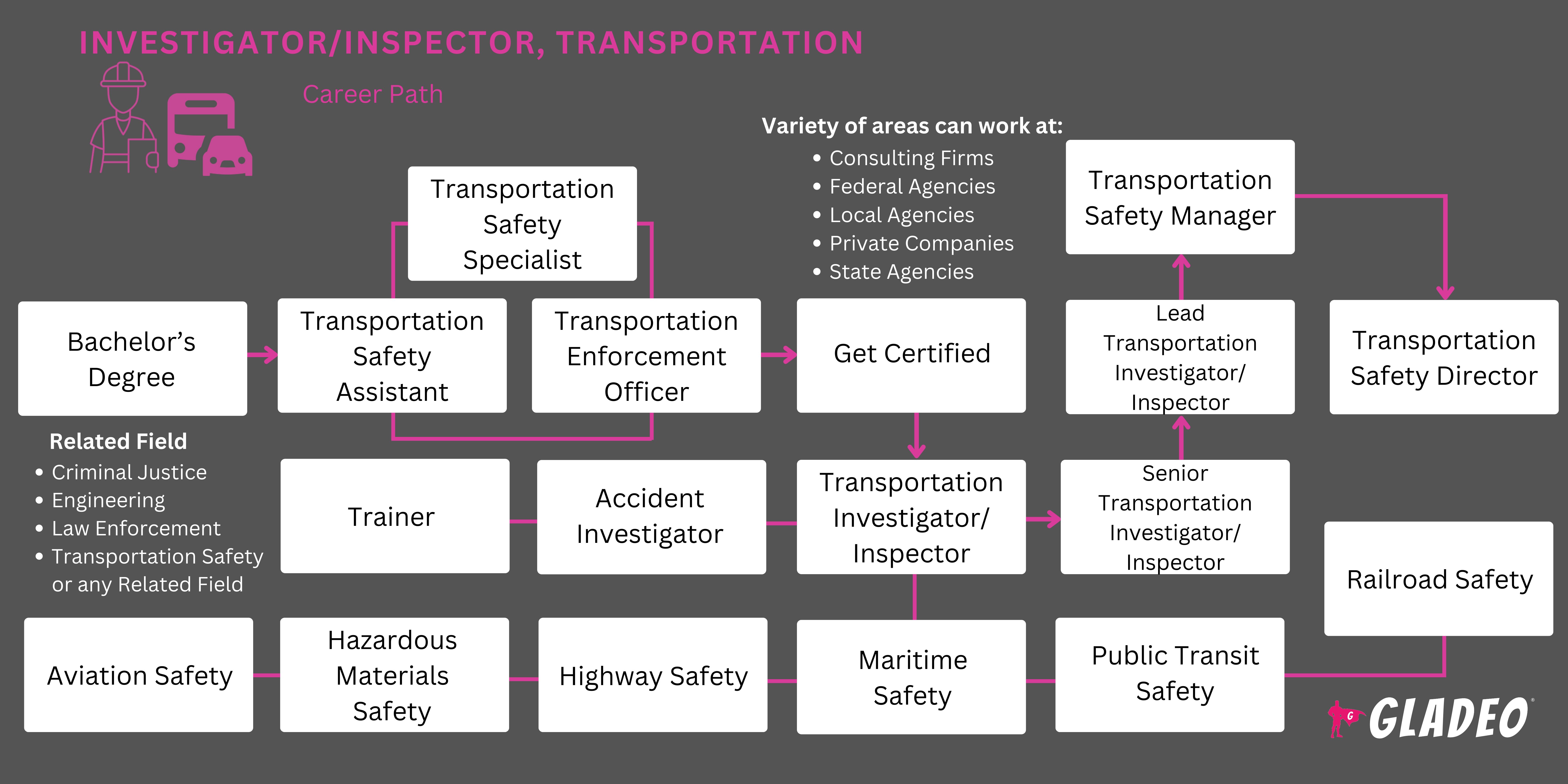Mga spotlight
Cargo Surveyor, Inspector, Marine Cargo Surveyor, Marine Surveyor, Petroleum Inspector, Transportation Safety Inspector, Compliance Investigator (Transportation), Regulatory Enforcement Officer (Transportation), Transportation Compliance Inspector, Transportation Regulatory Investigator, Transportation Safety Compliance Officer, Vehicle Inspector (Transportation), Commercial Vehicle Safety Inspector
Every day, almost 40 million tons of freight are moved within the United States via trucks, rail, and waterway vessels. This freight has to be regularly screened by Transportation Inspectors for many reasons, such as tracking inventory, ensuring correct products were shipped, checking for damage, applying accurate taxes and tariffs, and preventing loss.
Inspections are also done to verify safe shipping procedures for hazardous materials – and to secure the supply chain against illegal activities like smuggling and terrorism.
Transportation Inspectors are usually employed by government agencies such as the Department of Transportation and state agencies, but they can work for private companies, too. They are separate from inspectors with the Federal Aviation Administration, Transportation Security Administration, and Customs and Border Protection, although they all can share similar duties.
- Ensuring the safe transport of cargo and passengers
- Contributing to transportation process efficiency
- Deterring and uncovering criminal activity
- Playing an integral role in the national supply chain
Oras ng trabaho
- Transportation Inspectors typically work full-time with possible night, weekend, and holiday shifts.
Mga Karaniwang Tungkulin
- Review documents to determine cargo transportation capabilities
- Inspect cargo handling devices and storage facilities
- Oversee loading and bracing of freight into containers and vehicles to ensure compliance with applicable regulations
- Inspect shipments to verify safe, secure blocking and bracing and proper handling of fragile, hazardous, and perishable goods
- Notify workers of any special handling requirements
- Monitor temperatures and humidity in shipping and storage areas, when applicable for perishable or other temperature-controlled goods
- Mark vehicles with suitable hazardous materials warning signs
- Measure loads to ensure they can fit through bridges or tunnels along the route
- Measure vessel depths and issue compliance certificates
- Calculate vessel stability factors
- Visually inspect cargo for damage upon arrival or discharge
- Prepare and submit inspection reports
- Record details about freight conditions and observed problems
- Recommend corrective actions for any violations found during inspections
Karagdagang Pananagutan
- Communicate effectively with team members
- Stay up-to-date with industry regulations and best practices
- Ensure all equipment used for inspections is properly maintained and calibrated
Soft Skills
- Analitikal
- Pansin sa detalye
- Komunikasyon
- Koordinasyon
- Mabusisi pagdating sa detalye
- Sipag
- Mga kasanayan sa pagsusuri
- Pagsasarili
- Integridad
- Mga kasanayan sa interpersonal
- mapagmasid
- Mga kasanayan sa organisasyon
- Pagtugon sa suliranin
- Makatotohanan
- Pamamahala ng oras
Teknikal na kasanayan
- Ability to inspect vehicles, cargo, cargo blocking and bracing, labeling, and manifest documentation
- Basic understanding of vehicle systems (i.e., engines, brakes, suspension systems, and electrical components)
- Familiarity with electronic reporting systems/Fleet Management Systems
- Able to address minor issues such as spotting leaks, loose bolts, or worn tires
- Proficiency with diagnostic tools (OBD-II scanners, multimeters, and brake testers)
- Knowledge of regulations by the Federal Motor Carrier Safety
Administration, Department of Transportation, and other agencies - Understanding of cargo handling and transport techniques (i.e., proper securing, weight distribution, and hazardous materials management)
- Federal and state government agencies
- Transportation and warehousing companies
- Rail transportation companies
- Shipping companies
- Freight and logistics companies
Due to the nature of their work, many Transportation Inspectors are exposed to all sorts of outdoor conditions. As a result, they’ve got to be ready to face the elements, whether it’s extreme heat, freezing cold, or anything in between. For example, if they work on loading docks or at ports and harbors, they must be cautious of icy surfaces during the winter.
Whatever the conditions, inspectors don’t have the luxury of taking shortcuts. They’ve got to stay vigilant to ensure compliance with safety regulations and standards. Alas, they must also deal with cargo workers who can get frustrated or might want to rush things along. That’s why inspectors have to be able to hold their ground while doing their best to keep situations courteous and professional.
The transportation industry is increasingly leveraging technology to improve safety and efficiency. For instance, inspectors now rely on electronic documentation systems to streamline the recording and tracking of inspection results.
The supply chain itself is evolving to meet growing demands for real-time data, more agility, better forecasting, increased automation, and enhanced transparency.
Sustainability is also a priority. Inspectors evaluate vehicles for fuel efficiency and emissions compliance and ensure cargo handling minimizes environmental harm. They also need to know how to inspect electric vehicles that contain combustible lithium-ion batteries.
Transportation Inspectors are reliable and independent. They might have enjoyed activities that required attention to detail, problem-solving, and working with their hands. They likely had an interest in how things worked “behind the scenes,” which is great for a career related to logistics!
- Transportation Inspectors need a high school diploma or equivalent, with additional training in transportation safety and regulations
- Community colleges and vocational schools offer programs and certifications in transportation safety, logistics, and related fields
- Relevant course topics may include:
- Cargo handling and stowage
- Inspection techniques
- Logistics and supply chain management
- Pamamahala ng panganib
- Pagsusulat ng teknikal na ulat
- Transportation safety regulations
- Apprenticeships related to logistics, supply chain, freight, and transportation can also be a great way to learn
- Check out Apprenticeship.gov’s Search by Occupation feature to find relevant options and opportunities!
- Most positions require additional on-the-job training. State-specific licenses and certifications may also be needed
- Certifications can help make job applicants more competitive. Popular certifications include:
- North American Transportation Management Institute - Certified Cargo Security Professional
- Transit Safety and Security Division - Transit Safety and Security Program Certificate
- A bachelor’s degree isn’t needed but students can take community college or vocational school classes to learn the applicable job duties
- Look for accredited institutions offering training in transportation safety and logistics, and featuring hands-on training such as cooperative education experiences
- Paghambingin ang mga gastos sa matrikula at mga bayarin, na binabanggit ang mga gastos sa loob ng estado kumpara sa labas ng estado
- Suriin ang mga opsyon sa scholarship at tulong pinansyal
- Check out job placement statistics for students who complete the programs
- If applying for federal aid Pell Grants, make sure the money can be used to pay the tuition at your particular school of interest
- Veterans can seek military-friendly schools with on-site VA benefit experts
- High school math and physics classes are useful. If your school offers classes in automotive technology, consider taking those, too
- Gain practical experience through part-time jobs or apprenticeships related to supply chain, logistics, freight handling, and other transportation roles
- Enroll in a certificate or associate degree program in logistics, supply chain, freight, or transportation
- Network with working professionals in the field. Talk to them about their career paths
- Read about industry trends, especially new technologies
- Watch YouTube videos and read articles about transportation inspection

- To land a job as an inspector, you may need to gain relevant work experience first, then work your way up
- Review job ads on sites like ZipRecruiter, SimplyHired, Indeed, Monster, and Glassdoor
- Look at entry-level positions. Make sure you meet the education and experience requirements
- Review resume templates. Highlight relevant skills in your resume, using keywords from job ads such as:
- Pagsunod sa regulasyon
- Safety inspections
- Vehicle inspection
- Hazardous materials handling
- DOT regulations
- Pagtatasa ng panganib
- Accident investigation
- Preventive maintenance
- Compliance auditing
- Inspection reports
- Ask people in your professional network for tips about job openings
- Speak with your school about industry connections they may have or upcoming job fairs
- Request recommendation letters from previous supervisors or professors. Get their permission before giving out their contact information
- Prepare for interviews by researching common interview questions and practicing responses via mock interviews
- Run through some mock interviews with friends or your school’s career center
- Magsuot ng propesyonal para sa mga panayam sa trabaho
- Let your supervisor know you’re interested in growth opportunities when the time is right. Focus first on the job you were hired for and share your willingness to learn and advance
- Master your duties then keep learning more! Take advanced courses or complete specialized certifications such as Certified Cargo Security Professional or the Transit Safety and Security Program Certificate
- Use downtime to study regulations and learn about new technologies
- Sanayin nang maayos ang iba, dahil kung nagkamali sila, sumasalamin ito sa pagsasanay na ibinigay mo sa kanila
- Stress safety and compliance at all times. Be a leader with integrity and set the bar high!
- Earn a reputation as someone who is reliable and gets the job done right
- Join professional organizations such as the American Society of Transportation and Logistics
Mga website
- American Association of State Highway and Transportation Officials
- American Public Transportation Association
- American Society of Transportation and Logistics
- Federal Motor Carrier Safety Administration
- Institute of Transportation Engineers
- International Association of Transportation Regulators
- National Association of Railroad Safety Consultants and Investigators
- National Association of State Directors of Pupil Transportation Services
- National Safety Council
- Lupon ng Pananaliksik sa Transportasyon
Mga libro
- A Practical Guide to Logistics: An Introduction to Transport, Warehousing and Distribution, by Jerry Rudd
- Federal Motor Carrier Safety Regulations Pocketbook, by J.J. Keller
- Hazardous Materials Compliance Pocketbook, by J.J. Keller
- Intermodal Logistics and Transport: Multimodal as the future of green, effective and sustainable supply chains, by Arthur Wilson
Transportation Inspectors are vital for ensuring safety and compliance in the transportation industry, but it can take a while to work your way up to the job. If you're interested in similar careers, consider exploring the following options:
- Aircraft Cargo Handling Supervisor
- Airfield Operations Specialist
- Cargo and Freight Agent
- Inspektor ng Konstruksyon at Gusali
- Operator ng Kagamitan sa Konstruksyon
- Delivery Truck Driver
- First-Line Supervisor of Material-Moving Machine and Vehicle Operators
- Heavy and Tractor-trailer Truck Driver
- Railroad Worker
- Water Transportation Worker
Newsfeed

Mga Tampok na Trabaho

Mga Online na Kurso at Tool







